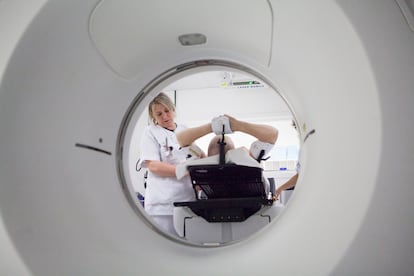Pioneering method can detect 14 types of cancer with a blood test
A new class of biomarkers increases the sensitivity of liquid biopsies in locating early-stage tumors from 10% to 62%

One of the main challenges in the battle against cancer is early detection. When a tumor is located in an organ, the long-term chances of survival are multiplied. However, the necessity to carry out invasive tests to detect many forms of cancer, the associated costs and the risk of returning false positive results mean there is still significant room for improvement. One of the clinical alternatives that has been under development in recent years is liquid biopsies, a type of blood analysis that allows for the detection of tumor DNA in the bloodstream when the tumor itself it still invisible.
However, these tests only achieve a sensitivity of about 10% in the earliest stage of the cancer, when it has not yet moved beyond the organ of origin, and there are tumors such as brain tumors that evade these analyses. Furthermore, some forms of cancer do not release detectable levels of DNA. A recent study estimated that around 12 types of tumors produce an adequate signal but some 30 of the most common types, which account for 50% of cases and a third of cancer deaths worldwide annually, remain beyond the reach of these tests. There are also doubts over the actual prognosis of tumors detected by current liquid biopsies, opening up the possibility that they lead to unnecessary diagnoses that are more harmful than beneficial. To combat this last deficiency, one of the measures employed is combining tests.
On December 5 the scientific journal PNAS published the results of a study that tested the potential of a new class of biomarkers, which could increase the odds that in the near future several types of cancer will be detectable at an early stage with a simple blood or urine test. In a proof-of-concept test, urine and blood plasma samples from 1,260 volunteers were analyzed for levels of glycosaminoglycans, molecules that can be linked to the presence of 14 types of cancer.
According to the authors of the study, this method succeeded in raising the sensitivity of early-stage tumors from 10% to 62%. Furthermore, it made it possible to predict the location of tumors with 89% accuracy. Another of the factors highlighted in the paper is that this new method would cost about $50 per test, between five and 10 times less than those that search for tumor DNA in the bloodstream, as liquid biopsies currently do.
Francesco Gatto, a researcher at the Karolinska Institute in Sweden and lead author of the study, explains that there are still further steps to be taken before this type of test becomes routine medical practice. “The next phase is to confirm the setting in which it would make the most sense to use it in a sample of more than 10,000 participants. Before it can be approved for use in the detection of various types of cancer, larger studies involving 100,000 participants would be necessary.”
Gatto believes that this type of test would be most effective in people “with a high risk of cancer; people who are over 55 or who have a family history of cancer.” In addition, the researcher says that these analyses could be used in conjunction with those that seek tumor DNA. “The same blood sample could be used to test for glycosaminoglycans and genomic markers. This combined capability could be sufficient to become a unique screening system,” he concludes.
To bring this type of liquid biopsy to market, Gatto and the study’s co-author, Jens Nielsen, co-founded a molecular diagnostics company called Elypta in 2017. It raised €21 million in funding last June to commercialize such tests. If these biopsies deliver on their potential, cancer mortality could be reduced by up to 15%, according to a study carried out by a team from US biotechnology company Grail, which is also focused on developing systems for the early detection of cancers.
Sign up for our weekly newsletter to get more English-language news coverage from EL PAÍS USA Edition
Tu suscripción se está usando en otro dispositivo
¿Quieres añadir otro usuario a tu suscripción?
Si continúas leyendo en este dispositivo, no se podrá leer en el otro.
FlechaTu suscripción se está usando en otro dispositivo y solo puedes acceder a EL PAÍS desde un dispositivo a la vez.
Si quieres compartir tu cuenta, cambia tu suscripción a la modalidad Premium, así podrás añadir otro usuario. Cada uno accederá con su propia cuenta de email, lo que os permitirá personalizar vuestra experiencia en EL PAÍS.
¿Tienes una suscripción de empresa? Accede aquí para contratar más cuentas.
En el caso de no saber quién está usando tu cuenta, te recomendamos cambiar tu contraseña aquí.
Si decides continuar compartiendo tu cuenta, este mensaje se mostrará en tu dispositivo y en el de la otra persona que está usando tu cuenta de forma indefinida, afectando a tu experiencia de lectura. Puedes consultar aquí los términos y condiciones de la suscripción digital.









































